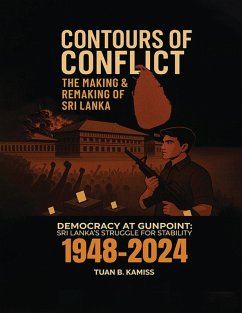Contours of Conflict: The Making & Remaking of Sri Lanka - Democracy at Gunpoint (1948-2024) by Tuan B. Kamiss is a powerful, personal, and panoramic chronicle of Sri Lanka's tumultuous political journey from independence to contemporary struggles. More than a conventional history book, it is a testimony part memoir, part exposé that blends lived experience with critical analysis to unearth the complex intersections of democracy, nationalism, ethnic identity, and statecraft in Sri Lanka. Spanning over seven decades, this nonfiction work traces the island's transformation from a hopeful dominion of the British Commonwealth into a fractured nation scarred by civil war, communal riots, populist demagogues, and systemic marginalization of minorities. The author courageously explores pivotal moments, from the 1953 Hartal uprising and the 1956 "Sinhala Only" policy, to the JVP insurrections, the rise and fall of the Rajapaksa dynasty, and the Aragalaya movement that shook the country's political elite. Through vivid storytelling, detailed research, and eye-witness memory, Kamiss unpacks the deeper implications of language politics, education reform, electoral shifts, and religious nationalism exposing how political decisions often amplified division instead of healing it. What sets this book apart is its deeply human lens. It documents not only leaders and legislation but also how everyday people especially marginalized Tamil, Muslim, and Malay communities experienced the ripples of national policy. From tear gas to textbooks, from burnt temples to ballot boxes, Kamiss captures the heartbeat of a nation often torn between its pluralistic promise and majoritarian impulses. Ultimately, Contours of Conflict is not just a history of Sri Lanka it is a meditation on justice, identity, and the cost of silence. It is a clarion call for reflection and reform, aimed at the youth who must now inherit and heal the island's wounded legacy
Bitte wählen Sie Ihr Anliegen aus.
Rechnungen
Retourenschein anfordern
Bestellstatus
Storno








